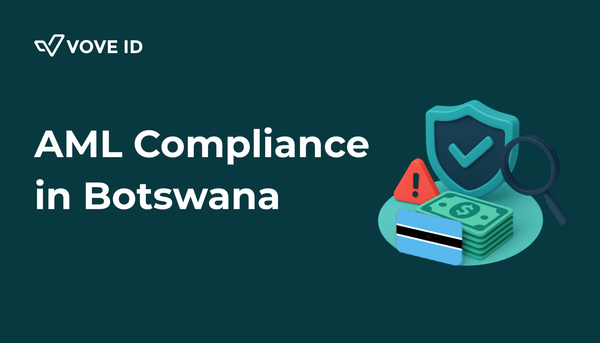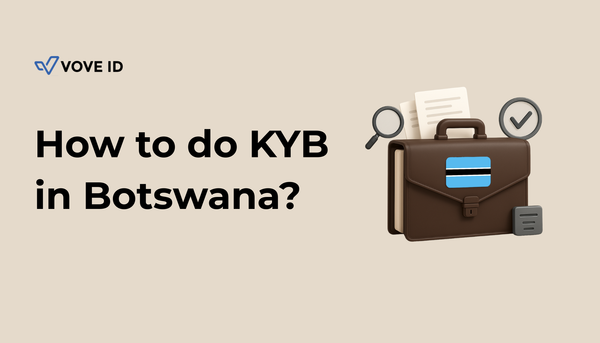KYB Compliance in Tunisia: A 2025 Guide for Regulated Businesses
KYB compliance in Tunisia made simple. Meet 2025 requirements from CTAF and BCT, verify UBOs, and streamline onboarding with VOVE ID.

Why KYB Matters in Tunisia’s Booming Fintech Scene
Imagine a Tunisian fintech startup, buzzing with ambition, ready to onboard a wave of new business clients. The app is sleek, the pitch is polished, but one misstep in verifying a client’s identity could lead to frozen funds, reputational damage, or costly regulatory action. In Tunisia’s fast-growing digital economy, Know Your Business (KYB) compliance is the foundation of trust and security.
With mobile money platforms like Tunisia Post and the rise of digital wallets, Tunisia’s fintech sector is projected to grow by 15% annually through 2027. But this growth comes with heightened scrutiny from regulators like the Tunisian Commission for Financial Analysis (CTAF) and the Central Bank of Tunisia (BCT). For fintechs, crypto platforms, and payment providers, robust KYB processes are critical to combat money laundering, terrorist financing, and shell company fraud. This guide breaks down Tunisia’s KYB requirements for 2025, offering actionable insights to thrive in this dynamic market.
Tunisia’s Regulatory Framework for KYB
Key Laws & Institutions
Tunisia’s KYB framework is embedded in its Anti-Money Laundering and Counter-Terrorism Financing (AML/CFT) regime, shaped by:
- Organic Law No. 2015-26, amended by Organic Law No. 2019-9: These laws mandate due diligence for financial and non-financial institutions, requiring verification of business identities and Ultimate Beneficial Owners (UBOs). Non-compliance risks fines or license suspensions.
- CTAF (La Commission Tunisienne des Analyses Financières): Tunisia’s Financial Intelligence Unit (FIU) oversees AML/CFT compliance, collects Suspicious Transaction Reports (STRs), and investigates financial crimes. In 2021, CTAF froze over $70 million in suspected money-laundering transactions, highlighting its enforcement muscle.
- Central Bank of Tunisia (BCT): The BCT regulates banks, leasing companies, and payment institutions, issuing KYB and Customer Due Diligence (CDD) guidelines. Its 2016 statute emphasizes financial stability and fraud prevention.
Tunisia’s FATF Journey
Tunisia’s exit from the Financial Action Task Force (FATF) grey list in October 2019 marked a milestone. After addressing deficiencies in its 2016 Mutual Evaluation Report, Tunisia aligned with FATF’s 40 Recommendations. However, a 2025 FATF follow-up review flagged delays in UN sanctions enforcement and limited oversight of certain high-risk sectors, signaling ongoing pressure to strengthen KYB processes.
The KYB Process: A Step-by-Step Breakdown
KYB in Tunisia is risk-based, tailored to the client’s industry, size, and risk profile. Here’s what regulated businesses must do:
1. Verify Business Identity
- Collect trade licenses or registration documents from the Tunisian Commercial Register (RNE).
- Obtain articles of association and tax identification numbers.
- Confirm the legal address via utility bills or lease agreements.
2. Identify Ownership & Control
- Identify UBOs (individuals owning or controlling 25% or more of the business) and authorized signatories.
- Verify UBO identities using national ID cards, passports, or E-Houwiya digital IDs.
- Cross-check against sanctions lists, including UNSC and OFAC.
3. Conduct Risk Assessments
- Screen for Politically Exposed Persons (PEPs) and adverse media.
- Assess risks based on industry (e.g., crypto or real estate), geography, and ownership complexity.
- High-risk clients require Enhanced Due Diligence (EDD), including source-of-funds verification.
4. Monitor & Report
- Monitor transactions for anomalies, such as irregular payment patterns.
- File STRs with CTAF within 10 business days of detecting suspicious activity.
- Retain KYB records for 10 years post-relationship, per Organic Law No. 2015-26.
Real-World Example: In 2021, Tunisian authorities convicted a Franco-Tunisian rapper, “Swagg Man,” for laundering $5.6 million through a shell company disguised as a charitable project. Robust KYB could have flagged the entity’s lack of legitimate activity, potentially preventing major financial losses and reputational fallout.
Digital Transformation: E-Houwiya and eKYB Solutions
Tunisia is leveraging digital innovation to streamline KYB. The E-Houwiya digital ID system, integrated with the National Identification Card database, enables real-time verification of individuals and company representatives, reducing manual errors and speeding up onboarding.
AI-powered eKYB platforms like VOVE ID amplify this by:
- Automating document verification and UBO identification.
- Screening against global sanctions and PEP lists in seconds.
- Integrating with E-Houwiya for seamless compliance.
For example, a Tunis-based crypto exchange using VOVE ID cut onboarding time from 48 hours to under 10 minutes while meeting CTAF standards, boosting customer satisfaction and regulatory confidence.
Challenges in Tunisia’s KYB Landscape
“Without KYB, you're not just risking non-compliance—you’re risking your business relationships, reputation, and runway.”
Despite progress, businesses face hurdles:
- Fragmented Data: Many Tunisian companies lack digitized records, complicating UBO identification.
- Resource Constraints: Startups often lack the budget for robust compliance teams.
- Evolving Risks: Tunisia’s $1.2 billion in annual illicit financial flows, driven by smuggling and tax evasion, heightens the need for vigilant KYB.
- Regulatory Pressure: The 2025 FATF follow-up review flagged delays in UN sanctions enforcement and limited oversight of high-risk sectors, urging stronger KYB measures.
How VOVE ID Simplifies KYB in Tunisia
VOVE ID empowers Tunisian fintechs and startups with:
- Real-time Verification: Validates business documents and UBOs instantly.
- Sanctions Screening: Checks against global and national watchlists.
- Ongoing Monitoring: Alerts for changes in ownership or risk profiles.
- E-Houwiya Integration: Leverages Tunisia’s digital ID for secure onboarding.
By automating KYB, VOVE ID reduces costs, minimizes errors, and ensures compliance with CTAF and BCT mandates, letting businesses focus on growth.
Did You Know?
Tunisia’s CTAF processed over 1,200 STRs in 2023, a 30% increase from 2020, reflecting heightened vigilance against financial crime. Failure to comply can lead to fines of up to TND 50,000 or even license revocation.
Conclusion: KYB as a Competitive Edge
In Tunisia’s vibrant digital economy, KYB is more than a regulatory obligation—it’s a strategic advantage. By verifying business partners and mitigating risks, companies build trust with regulators, clients, and investors. As FATF scrutiny intensifies in 2025, early adoption of digital KYB solutions like VOVE ID will set fintechs and startups apart, enabling them to scale securely in a competitive market.
Ready to simplify your KYB process? Discover how VOVE ID helps fintechs in Tunisia stay compliant and scale with confidence. Book a demo!




